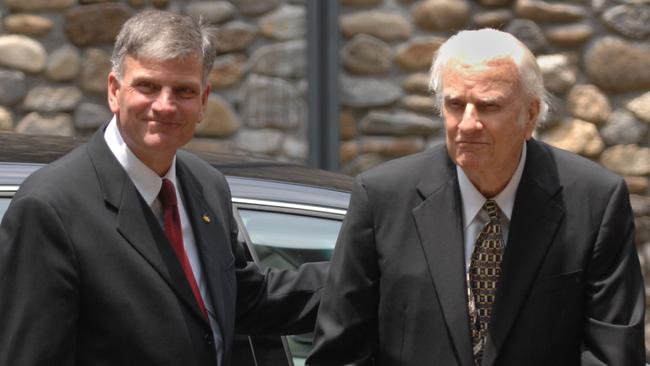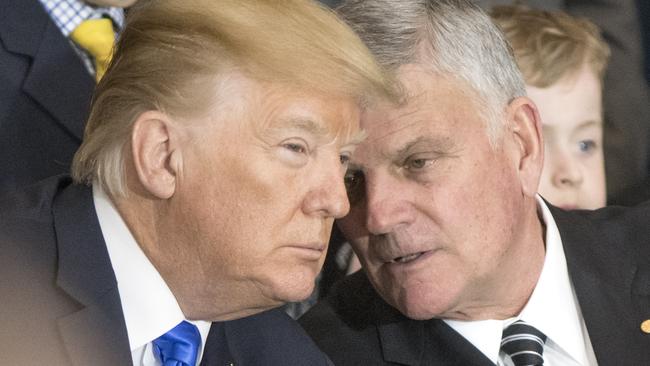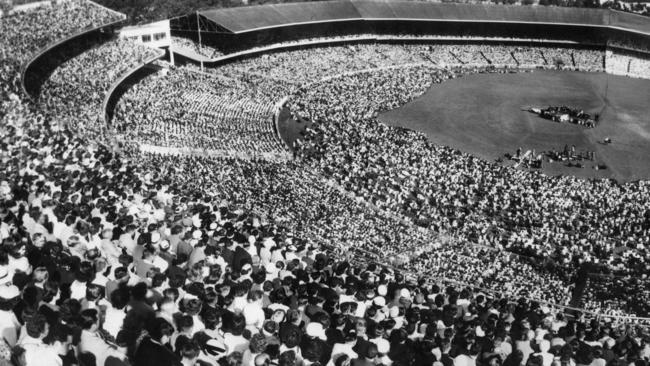
It’s no easy thing being a famous man’s son, especially when you’ve chosen your dad’s line of work. Franklin Graham is nonetheless a big figure in his own right in American evangelical Christianity.
No doubt unfairly, he can never quite avoid comparison with his father, Billy Graham, an icon of 20th-century Christianity.
And no one can really stand a comparison like that. Next week, in Perth, Franklin starts an Australia-wide tour. Sixty years ago his father made his first big crusade in Australia. An astonishing one-third of the population of Australia went to hear him speak in 1959.
That’s not a misprint. One-third! Graham Sr attracted a record 130,000 people to one event at the Melbourne Cricket Ground alone. The photos recall a vanished Australia — a sea of people, a near-empty stage, a single figure. He was in Melbourne for a month and well over 700,000 people went to his events. Across Australia, 130,000 people came forward at these events to give their lives to Jesus.
The statistics may be exaggerated only because many people obviously went to hear him more than once. But consider this comparison: has there ever been a Hollywood blockbuster that sold tickets in Australia equivalent to a third of the population?
With Tony Abbott and an evangelical friend, I went to see Billy Graham at Sydney’s Randwick racecourse in 1979. He was compelling and brilliant, with his dramatic gestures, magnificent voice, Hollywood good looks.

Neither Abbott nor I felt impelled to join the throngs coming forward to commit their lives, simply because we were already Catholics. And our evangelical friend had already made her commitment. So we watched the performance with some admiration from the bleachers.
The most striking thing about Billy Graham that night was that he didn’t need any light show, aerial distractions, high-gloss entertainment — it was just a man, a stadium full of people, and passionate conviction.
And yet, in his dramatic pauses, he achieved from a vast Australian crowd perfect silence and rapt attention.
His son Franklin has been a sometimes controversial figure. He has criticised Islam, backed US President Donald Trump, once questioned whether Trump’s predecessor Barack Obama was a Christian (though later accepted Obama’s assurances on the matter). He also champions the traditional definition of marriage as being between a man and a woman.
But Graham would argue that these things are all beside the point. Before we get to the controversies, let the man explain his purpose in his own words: “I am coming to Australia to preach the simple gospel message of God.
“The gospel message is very simple. God loves us, but we have a problem. That problem is sin and that sin separates us from God.
“The penalty for sin is death, so the whole human race is under a death sentence from God. Yet the Bible tells us that God so loves the world that he gave his only begotten son that whosoever believeth in him, will have eternal life.
“I’m asking people to put their faith in God, to turn from their sin and trust Jesus by faith.”
In a long phone discussion with Graham this week, I asked him about Trump and American society, and he had a lot to say. But his priority is his religious message. One of the bracing qualities of American evangelical Christianity and its Pentecostal branches is that they don’t compromise their beliefs out of embarrassment at the unfashionableness of such beliefs in popular culture.

I put it to Graham that the biggest division in Christianity today is not between denominations but between those Christians who believe in the supernatural claims of Christianity, the bodily resurrection of Christ and all the rest, and those who find such beliefs insupportable in the modern day.
He replies: “There are churches that have turned their backs on God. They have been influenced by the culture. But Christians, the churches, are called by the gospels not to be influenced by culture, but to influence culture.”
Consider his views on the nature of evil: “I believe we have goodness in us and that goodness is Jesus. But there’s also evil in the world, and that evil comes from the devil. And he’s a real person and he wants to pull people into evil. He’s a deceiver. There’s a lot of darkness in the world. The only solution is for people to come into that warm light of God.”
Franklin Graham is regarded as a conservative. So was his dad. Yet both were happy to deny the prejudices of conservatives if they conflicted with what they saw as essential elements of Christianity.
Billy Graham was born and grew up in the deep, and then still segregated, south. As Franklin points out, his father was born only a few decades after slavery was abolished.
Yet from the very first moment of his ministry, he refused to have any segregation in his churches or at his meetings. He became a close friend of Martin Luther King Jr and bailed him out of jail when King was arrested in the course of his civil rights campaign.
Before he began preaching 20 years ago, Franklin, now aged 66, spent decades working full-time for the Samaritan’s Purse, an evangelical organisation that exists to provide aid to marginalised and persecuted people in some of the most difficult spots in the world.
But it was not inevitable that Franklin would follow Billy into either preaching or even active Christianity.

Did having such a famous dad cause young Franklin problems?
“I think I caused him problems. At an early age I decided to live my own life, and if that embarrassed my father that was just too bad.
“I was 22 years old when I became sick and tired of just being sick and tired. I realised I was running from God.
“At that point I had to decide what God had in mind for me to do for my life. I said to God: if you can pick up the pieces of my life and make something of it, it’s yours.
“I went home after a few days and told my father. I knew I couldn’t be Billy Graham. About 20 years ago I heard God call me to preach. I was a little nervous because I knew people would compare me to Billy Graham and be disappointed. I’m not coming to Australia as Billy Graham. I’m coming as Franklin Graham.”
Franklin accepts that there has been a massive decline in the proportion of people in Western societies identifying themselves as Christians, even though Christianity, and much other religion, is on fire in most other parts of the world. What explains this decline in the West?
He nominates the secularisation of the West and the temptations of sustained affluence.
“When I was growing up in the late 1950s and 60s, there was a great cultural shift in the West. As a result a lot of young people experimented with drugs and sexual relationships.
“These people are now parents and grandparents. A lot of these people have not tried to pass on the religious inheritance to their own children.
“So a lot of young people have no understanding or concept of who God is or of God’s love for us.
“Every new generation has to hear this message for itself. I would encourage Australian churches to think about how they communicate to this next generation of young people.
“But I’m not discouraged, I’m encouraged. It shows there’s more need for evangelists than ever.”
He also identifies the growing hostility of Western secular culture towards Christianity: “If Hollywood portrays a Christian, he’s either a person who committed adultery or he’s a pedophile.”
What will society lose if it loses religious belief?
“We lose our moral compass, that’s what we lose. Where do we get most of our basic law? It comes from scripture. Thou shalt not steal. Thou shalt not commit murder. Thou shalt not bear false witness.
“I think, as a nation, our culture will descend eventually into chaos. In parts of the world where the Christian faith has not had much of an influence, such as the modern Middle East, it’s scary what people have to endure.
“I’m glad that America and Australia have had their Christian experience, that gives us our freedom … Communism and secularism are not the same thing, but they are both godless ways of organising government.”
Graham’s message and priorities are not predominantly political. But he happily answers any question I put and does not shy away from political questions.
So what does he make of Trump?
“We have a president who is very friendly towards evangelicals. He has a number of evangelicals in his cabinet, a number of evangelicals work on the staff in the White House.
“There’s something about this president. He’s rough around the edges. He’s not a politician, he says what he thinks. That turns off a lot of people. Others find it refreshing that he just says what he thinks.
“He is a man who has done a lot of good so far, in making efforts to defeat ISIS, in lowering the taxes that Americans pay, in getting some good conservative judges.
“I know this won’t last. The pendulum will swing in the other direction and maybe the next administration will be very hostile to the Christian faith.
“I think we take what we can, when we can. Right now we do have an administration that is friendly to the Christian faith. You have to take the bitter with the sweet. No one is perfect, no president is perfect. I encourage Christians to pray for him.”
These pro-Trump views are intensely controversial among American Christians.
While all the Christian groups have their different political and theological views, perhaps Graham’s core message is less controversial among Christians and yet more confronting for Western culture.
He says: “Affluence, I think, brings apathy. Why do we need God when we’ve got everything that we have — TVs, cars, nice restaurants, good salaries.
“But even if we have affluence, the longing in the human heart is the same for every generation. There is not a person who has not asked: Who am I? Why am I here? What is my purpose?
“There is a void in the human heart that only God can fill.”




To join the conversation, please log in. Don't have an account? Register
Join the conversation, you are commenting as Logout